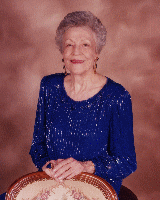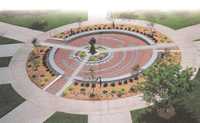
Rosalyn W. Gore
is honored with a Premium Paver from Gore Scholars Alumni: Barbara Ann Addison, David J. Austin, Dr. Kent W. Blakely, Cheryl A. Doll, Saideh Eftekhari, Sherry Sue Elder, Clinton J. Everton, Celia Anne Goering, Deborah Gene Haynes, Jennifer M. Holthaus, Valencia Kaye Monk-Morgan, Jodi Ann Newmark, Peggy Norris, Kelly D. Pinkham, Terry M. Rombeck, Cathleen J. Sullivan, Malaika N. Woods

Rosalyn Gore was a fifth generation Texan. She was one of only two members of her family who, as she termed it, "defected" from Texas. She was born December 22, 1915 in El Paso where she lived until she attended the University of Texas at Austin.
Rosalyn graduated from high school at the age of 16. She attended summer school, then day and night school during the regular school term and another term of summer school at the University of Texas at El Paso (then called Texas College of Mines). At that time she went to Austin to major in costume/fashion design but had to quit because of an emergency appendectomy. The Depression created a necessity to work, which prevented Rosalyn from returning to college.
Rosalyn's talent for fashion design led to a scholarship offer at the Pratt Institute in New York to study fashion. However, finances prevented her from attending. When Rosalyn was forced to quit school, she received a department store job for which she received $12.50 per week. Rosalyn gave $6 of her weekly wage to her mother for the family.
In 1936, Rosalyn began to work with the International Boundary Commission, a division of the State Department, which dealt with situations along the United Sates and Mexican border. Because Rosalyn had learned to speak Spanish before she could speak English, she served as translator for the "big shots".
Rosalyn was transferred to Demming, New Mexico in February 1942 where she was stationed at the first air base located between Texas and the Pacific Ocean along the southern border. When she received papers assigning her to the Zeus Project, Rosalyn requested that she be transferred to Dallas instead. She was tired of small town life and wanted to be in the middle of the action for a change. Rosalyn later discovered the location of the mysterious Zeus Project, a place which certainly everyone recognizes as a piece of history - Los Alamos.
Despite her disappointment at not having been a part of an historical event, all had not gone wrong for Rosalyn. It was in December of the following year that Rosalyn met her future husband, Theodore Gore. The rest, as they say, was history!
In discussing the philosophy behind the Gore Scholarship, Rosalyn explained that the scholarship was established in an effort to address a desperate need for quality leaders. It was the hope and desire for the Gore family to assist in the development of leadership which could be utilized anywhere -- at Wichita State, in the community, or at the state or national level. Rosalyn emphasized that leadership does not necessarily mean politics, as she believed the two have been interchanged to where people believe that one means the other. Leadership may be used in any capacity and the Gore family has encouraged that through its dedication to the university and to the scholarship recipients.
Rosalyn believed that the university could do a more effective job of promoting the scholarship both locally and nationwide. However, she did not, nor does any member of the Gore family, require any particular act of appreciation from the scholarship recipients. Instead, she viewed the accomplishments and personal development of the Gore Scholars as sufficient thanks.
Rosalyn Gore passed away Oct. 3, 1994. She was an intelligent woman with a great deal of independence, charity, and respect for great leaders. Those who had the pleasure of visiting with her were challenged to support their ideas and opinions on topics ranging from local events to world politics. Rosalyn's enthusiasm for personal knowledge of the things occurring around her was contagious. She knew what she believed in and was not ashamed to share those beliefs with others. She was a dynamic individual who represented the ideals of the Gore Scholarship in an outstanding manner.
Rosalyn Gore was a devoted stewardship of Wichita State's Gore scholarships best demonstrated the ideals of those awards. Her dedication to Wichita State and its Gore scholars spanned some forty years.
In 1952, her husband Theodore and his brother Ralph established the extraordinary Gore Scholarship at Wichita State University in memory of Harry Gore, their father. Harry Gore, believing that a greater Kansas would emerge as its outstanding young leader-scholars were encouraged to pursue education beyond high school, had provided counsel and financial assistance to countless young people.
Since 1954, Gore scholarships have been given annually to entering freshmen who display outstanding potential for leadership. In just forty years, one and often two awards a year have enabled fifty-two students to earn their college degrees from Wichita State. Currently awarding $40,000 over four years, the Gore Scholarship has become one of the largest and most prestigious awards in the nation.
Theodore Gore died in 1982, and, over the ensuing years, Mrs. Rosalyn Gore persevered in fulfilling the goals envisioned for the Gore Scholarship - and Wichita State's Gore scholars. The Gore family's hope was to assist in the development of leadership that could prove effective anywhere.
Therefore, the Gore Scholarship is not based upon financial need. It does not place restrictions either in studies of activities upon its recipients. It encourages personal growth and involvement in leadership positions.
Rosalyn Gore herself represented that kind of leadership well. Her son Andrew Gore remembers, "My mother understood that there was the potential for value in the scholarship that far outweighed its financial assistance. She assumed a leadership role in the development of the Gore Scholars. That was her interest, and certainly her ability - the individual attention to each of them." Mrs. Gore organized reunions and social activities to introduce new Gore scholars to current and past recipients. She realized that, beyond the networking possibilities inherent in such a unique "fraternity," their shared values and achievements would enrich the possibilities for each and every one of them.
Dr. Deborah Haynes, who practices at Wichita's Northeast Family Physicians and is a member of the Endowment Association's Campaign for Students' Blue Ribbon Leadership Team, was the 1972 Gore scholar. She says, "The Gore Scholarship truly opens doors and provides opportunities. The scholarship - and Mrs. Gore's dedicated mentoring - gave me a level of confidence that inspired me to take on things that I might not have otherwise, and I believe this was true of many Gore scholars. She was a remarkable woman."
Mrs. Gore exemplified leadership in other activities as well. She was involved with Hadassah, a woman's organization dedicated to improving health care and education in Israel through medial facilities and vocational education: and Youth Aliyah, an organization that aids refugee children worldwide. She was Hadassah's Wichita chapter president for five years, regional president for three years, and a national board member for three nine year terms. In 1984, to honor her service to Wichita State University, the WSU Alumni Association presented her its Recognition Award.










